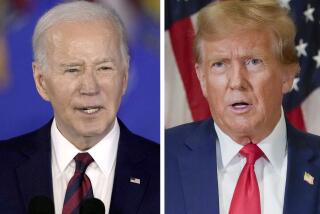Times-Economist Poll : Americans, Allies Believe Reagan Erred
Americaâs British and West German allies believe that President Reagan has blundered in handling the Iranian arms crisis and--like Americans--overwhelmingly reject his contention that he knew nothing about profits from the arms sales funding Nicaraguan contras, a Los Angeles Times-Economist poll has found.
People in all three countries also concur that Reagan has undermined his own anti-terrorist policy but disagree dramatically on assessing the Presidentâs overall job performance. Although his popularity is slipping at home, half the Americans polled still approve of the way he is doing his job. In Britain and West Germany, only about one-quarter of the respondents rated him positively.
The poll, conducted between Dec. 6 and 9, was a joint effort by The Times and the Economist, a London weekly journal of fact and opinion, to measure perception of the Administrationâs foreign policy. The Times polled a cross section of 1,800 Americans while the Economist polled 1,096 residents in Britain and 500 in West Germany.
Similar Concerns
Generally the poll found that people in the three countries share similar concerns and perceptions. All three, for instance, favor by a large margin a nuclear arms agreement with the Soviets. There is also widespread uneasiness over American foreign policy, particularly in Central America and the Persian Gulf area.
Coinciding with growing public dissatisfaction over foreign policy is a continued erosion of Reaganâs credibility. Only 13% of Americans and about 8% of Europeans believe Reagan âknew nothingâ about siphoning of Iranian arms profits to the contras, as he claims. Most people--87% in Britain, 86% in West Germany and 82% in the
United States--think he knew âsomethingâ or âeverything.â In a poll last month conducted by Times Poll Director I. A. Lewis, 79% of Americans rejected Reaganâs statements on television that the United States was not swapping arms for hostages with Iran.
Some political analysts believe that the public skepticism at home and abroad will make it difficult for Reagan to carry out an effective foreign policy during his final two years in office. In the United States, 55% of the respondents approved Reaganâs handling of foreign relations 10 months ago; today, only 43% do.
Damage to Credibility Cited
Nearly eight of 10 people in the three countries agree that secret U.S. arms deals with Iran and the contras have damaged the credibility of the United States as the leader of the Western alliance. A two-thirds majority in the United States and Britain also believe the deals will convince the Soviet Union that âU.S. foreign policy is weak and disorganized.â West Germans were unclear on the probable Soviet response.
Still, two out of three Americans and nearly 80% of West Germans and Britons are hoping for a breakthrough with the Soviet Union and say that the United States should conclude a nuclear arms agreement with the Soviets. But there is diversity of opinion on the two continents over Reaganâs anti-missile defense project, often referred to as âStar Wars.â
âStar Warsâ Support
Half the Americans support the project, saying it would âmake the world saferâ and would enable the United States to maintain military superiority. Thirty-one percent oppose âStar Warsâ and 19% said they hadnât made up their mind.
âStar Warsâ is narrowly opposed (41% to 35%) in Britain and solidly opposed in West Germany (68% to 14%), with about one in five persons undecided. Americans who opposed the project gave as their reasons that it would be a waste of money and would not work. Europeans were most worried that âStar Warsâ would lead to an arms race in space or be a waste of money.
Reagan finds little support for dealing with Iran, which the President has said he did to open channels to so-called moderates in the Islamic republic, not to win the release of American hostages held in Lebanon. In the poll, 74% of West Germans, 72% of Britons and 65% of Americans disapproved of dealing with Iran.
Americans and Britons cited two prime reasons for disapproving--their objections to any kind of contacts with the Khomeini regime and their dislike of the âsecrecy-deceptionâ used by the White House. The West Germansâ main concern was over the supply of weapons to Iran.
In The Timesâ November survey, Americans supported by better than 2 to 1 an embargo on the sale of weapons to all countries that sponsor terrorism. The State Department lists Iran as one of five nations sponsoring international terrorism.
Contra Aid Opposed
White House policy in Central America is almost as unpopular as that in Iran. A majority--ranging from 62% in the United States to 57% in Britain--disapprove of the way Reagan is handling relations there and, in a question not asked of Europeans, 51% of Americans said Congress should cut back on aid to the contras. Thirty-five percent said aid should be maintained at existing levels.
Asked to rate Reaganâs job performance, one in four Americans said they âstrongly approvedâ and the same number said they âstrongly disapproved.â Another one in four âtended to approve.â That 50% overall approval rating is down from 58% in The Timesâ November poll and down from 68% in a Gallup Poll last June.
The survey discovered a surprising degree of ignorance of foreign affairs on both sides of the Atlantic, indicating that domestic issues remain the prime concern of most people. Asked where Nicaragua was located, 27% of Americans didnât know or thought it was in Africa, Asia, the Middle East or the South Pacific. Thirty-four percent of the West Germans and Britons responded similarly.
The margin of error for the survey is 3% in either direction in the United States, 4% in Britain and 5% in West Germany.
HOW THE U.S. AND ITS ALLIES VIEW THE IRAN-CONTRAS AFFAIR
âThe arms deals with Iran and Nicaragua have damaged the credibility of the U.S. as the leader of the Western alliance.â
AGREE DISAGREE U.S. 78% 19% Great Britain 73% 19% West Germany 84% 10%
Do you think the Reagan Administrationâs tough stand on terrorism has been undermined by the arms deal with Iran, or do you think that its policy position has been maintained?
UNDERMINED STILL MAINTAINED U.S. 57% 33% Great Britain 64% 26% West Germany 53% 31%
President Reagan says he knew nothing about the fact that profits from the sale of weapons to Iran were being used to supply the contra forces. Do you think he:
KNEW NOTHING KNEW SOMETHING KNEW EVERYTHING U.S. 13% 60% 22% Great Britain 9% 54% 33% West Germany 7% 45% 41%
Do you approve or disapprove of the way Ronald Reagan is handling his job as President?
APPROVE DISAPPROVE U.S. 50% 40% Great Britain 26% 50% West Germany 22% 51%
Source: Times-Economist Poll
More to Read
Get the L.A. Times Politics newsletter
Deeply reported insights into legislation, politics and policy from Sacramento, Washington and beyond. In your inbox three times per week.
You may occasionally receive promotional content from the Los Angeles Times.










